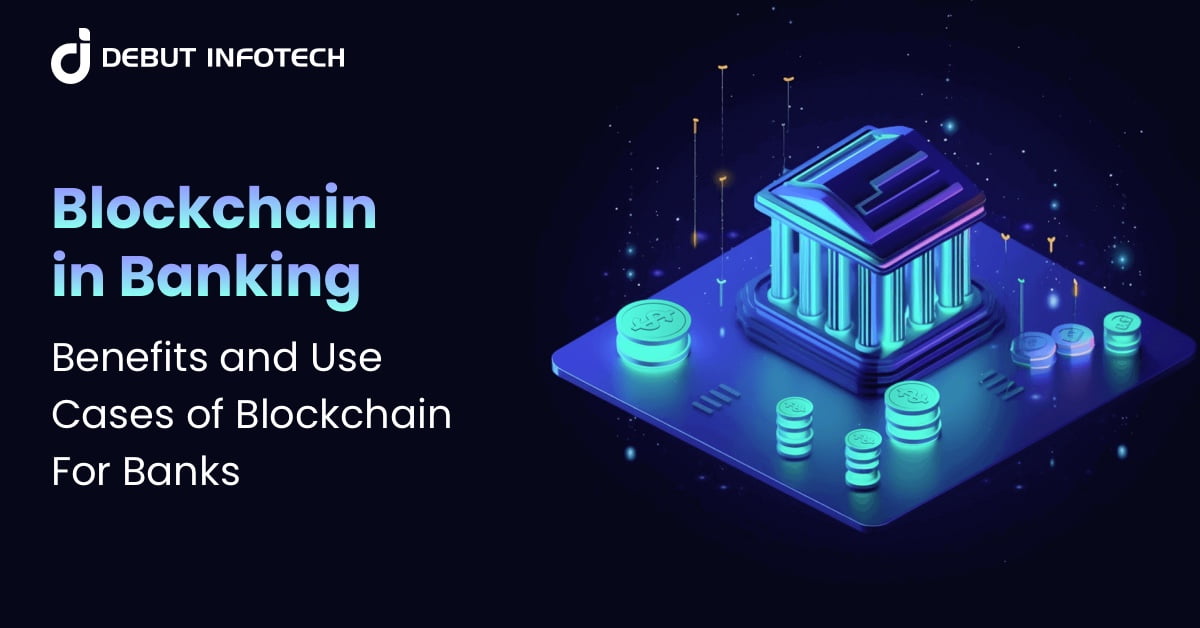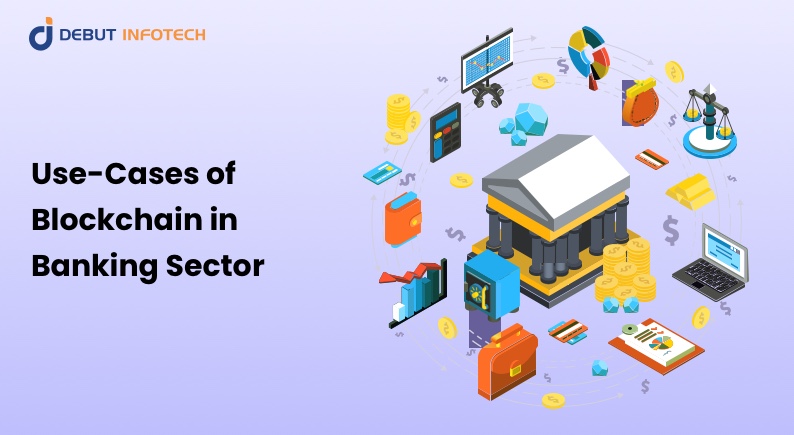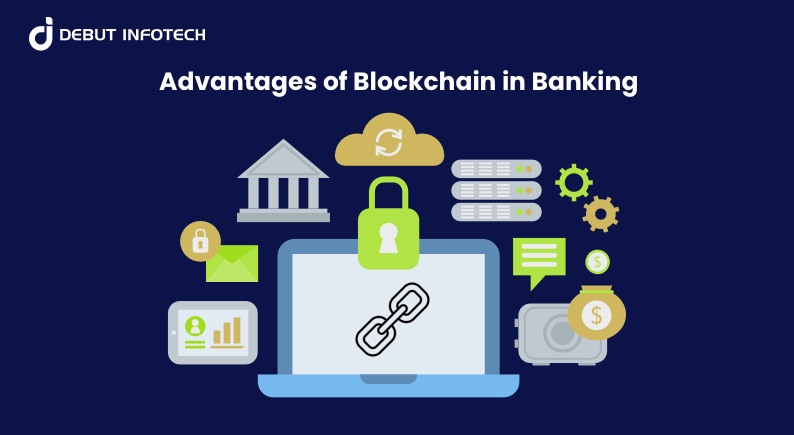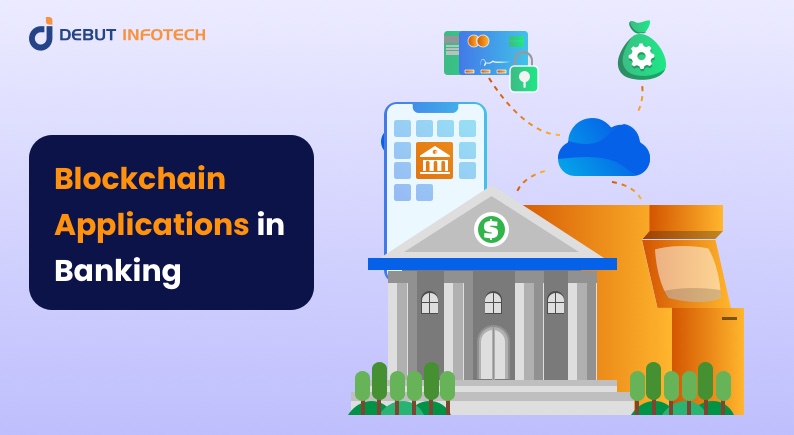Table of Contents
Home / Blog / Blockchain
Blockchain in Banking: Benefits and Use Cases of Blockchain For Banks
January 2, 2024

January 2, 2024
Technology has taken a toll on the entire financial ecosystem with its swift and transparent peer-to-peer blockchain network, compelling banks to accept the innovative nature of the technology. Thus, blockchain in banking emerges as a robust landscape that benefits consumers and the banking sector.
The partiality of banks toward blockchain is due to the excellent outcomes of the said technology. Thanks to its transparency, security, and fast and decentralized transaction system, blockchain technology is growing significantly in market size. As per statistics, the global blockchain market value will be around 17.57 billion USD in 2023, and with a forecasted growth of a CAGR of 59.9 percent, it will reach a stunning amount of approximately $469 billion.
This article will cover the blockchain in banking and finance and its benefits to consumers and other corporations for proven financial well-being. Let’s uncover blockchain technology’s applications in banking in detail.
Blockchain Technology – The Futuristic Solution to Security Risks
Blockchain is an innovative technology with applications and benefits in many industries and landscapes, including financial technology (FinTech), digital identity, digital voting systems, and more. A distributed ledger system is a record-keeping network made of blocks over blocks. Each block comprises specific data with equal accessibility to each network member.
The blockchain works on peer-to-peer (P2P) infrastructure, the modern alternative to client-server networks. In this type of network, two or more devices connect to share resources needless of an external or third-party server. Therefore, the transactions hosted on the P2P network are faster and more reliable than its counterfeit solution with quick file sharing, reduced cost, and robust adaptability.
The cost-effective nature of blockchain-as-a-service infrastructure has made it convenient for enterprises and public sector institutions to enjoy the advanced technology. The extensive benefits of blockchain technology in banking and other industries have revolutionized the financial landscape.
What Is Blockchain in Banking?
Before we jump into the uses of blockchain in the banking industry, it will be convenient to understand the link between banks and blockchain. Banking and blockchain function with an opposing business model. Banks are centralized, implying that a central body governs its transactions and business operations. On the flip side, blockchain is a decentralized model, free from the intervention and disruption of government institutions and central authorities.
The best example of blockchain’s decentralized finance (DeFi) is cryptocurrency and non-fungible tokens (NFTs). Additionally, Web3 applications run on a blockchain network offering state-of-the-art security without central bodies’ authorization. Therefore, a question may strike your mind: What is blockchain technology in banking?
Since blockchain guarantees decentralization, immutable and efficient record-keeping, and unbeatable security, banks want to amalgamate these lucrative qualities with their existing financial model. Thus, blockchain in the banking sector will reduce the number of individuals and organizations involved in financial transactions, resulting in lower expenses and excellent performance.
Use Cases of Blockchain in Banking

The use of blockchain in banking ensures several advantages over the conventional business operation of the banking industry. Here comes the question of how blockchain can be used in banking. As both are opposite landscapes, this question is valid and needs answering for a better understanding of the future possibilities in the banking sector.
An outline of the applications of blockchain in banks is as follows:
- An effective settlement system
- Central bank digital currency
- Easy accessibility of P2P transactions
- Robust digital identity verification
- Efficient accounting and financial analytics
- Financial trades and monetary lending
Let’s explore each use case of blockchain technology in banking with relevant details.
1. An Effective Settlement System
Suppose you must make a transaction using a traditional banking system to another country or state in the US. The faster time for the transaction to reach the recipient will be about 2 to 5 business days. The long duration of the conventional banking system upsets consumers since they may face complications due to the banks’ delayed and stringent financial settlement system.
On the contrary, blockchain-powered financial systems support swift and decentralized financial settlement infrastructure that reduces the transaction verification time to a few minutes or hours. Regardless of the location to which you want to transact, blockchain-backed finance solves your problem instantly.
Therefore, the digital payment market is on track for faster growth, with a projected CAGR of 11.83%. It will result in the digital payment model getting a global market value of over 14.78 trillion USD by 2027, as per a FinTech report. Blockchain technology can help banks exploit the fruits of secure and fast digital payments with its decentralized and effortless operation.
2. Central Bank Digital Currency
Developed countries, including the US, the European Union, China, etc., have opted to introduce cashless societies with the surge in digital currencies. Countries offer government-backed money with physical commodities on their backs. After the catastrophic financial market of the pandemic, developed countries understand the importance of the cashless and digital payment ecosystem.
Thus, Central Bank Digital Currency (CBDC) emerged as an optimistic innovation, combining technology for the government’s and civilians’ financial needs. CBDC is a blockchain-based fiscal system with every perk blockchain technology offers in the monetary world. With a lower cost of maintenance of CBDC, consumers can enjoy cost-effective economic uses of digital currency.
Furthermore, CBDC allows users and corporations to enjoy promising privacy in transactions, convenient monetary settlement, and borderless accessibility. CBDC is a centralized digital alternative to fiat currency that functions on a decentralized blockchain network. With this application of blockchain in banking, digital payments become secure and risk-free for businesses and individuals.
3. P2P Transactions for Blockchain in Banking
The peer-to-peer transaction system is another blockchain application in banking. It provides convenience in the widespread use of digital payment systems in society. PayPal is the leading P2P service provider in the US, and a survey conducted in 2023 suggested that about 49 percent of users prefer it over traditional banking transfer.
With the rising demand for P2P transactions globally, banks should employ blockchain technology as it offers a secure and high-performing Peer-to-Peer network for businesses and consumers. The banking sector won’t have to develop anything new but integrate the preexisting network into its financial infrastructure.
Thus, blockchain in banking will help banks fulfill their users’ needs and offer businesses a centralized yet faster monetary solution. Furthermore, P2P lending services allow users to circulate their money without a bank. The adoption of blockchain will help the banking industry to directly get the advantages of P2P lending, securing lucrative outcomes in the process.
4. Robust Digital Identity Verification
Conventional banking institutions provide their consumers with digital solutions to financial affairs, including mobile banking apps or web services for swift banking operations. However, it poses a threat of cyberattacks on the banking network alongside phishing scams from malicious actors, such as black-hat hackers or telemarketing scams.
Conversely, blockchain has an inevitable identity verification system that is much better and more secure than two-factor authentication, call or text verification. Integrating blockchain-chain-powered digital identity verification in banking operations will secure users and banks from falling prey to financial scams.
With over $48 billion scams happening in 2023 in the eCommerce industry alone due to weak identity verification and other factors, blockchain is a necessary technology to end evil masterminds taking away victims’ monetary assets. Therefore, blockchain in banking will save them from substantial monetary compensation for the hacks.
5. Efficient Accounting and Financial Analytics
Blockchain in banking has an application in the accounting space with immutable data storage. Since the entire network will approve the change, it will become highly complicated for anyone to change the data for scamming or stealing purposes. Thus, blockchain-powered bank accounting and auditing become secure and safe from intrusions.
Additionally, banks can cut off the widespread use of paperwork for bookkeeping due to the tamper-proof record-keeping characteristic of blockchain technology. With customized access to the information for network participants, including employers, employees, and customers, blockchain technology in the banking industry will create a safe working atmosphere.
Benefits of Blockchain in Banking

There are several advantages of blockchain in banking, such as:
- Matchless Security
- KYC and AML Support
- Faster Transactions Across the Border
- Cost Management
The use cases of blockchain technology in the banking industry have ensured that the technology is the best fit for advancing existing financial technology. Now, let’s discuss the top benefits of blockchain in banking:
1. Matchless Security
Banks are responsible for storing millions of consumers’ data. A little miscalculation or displacement of information can expose them to a massive monetary loss. Therefore, banks require an invincible security system to safeguard the users’ data.
Thanks to blockchain’s encryption of the network and block-based record-keeping, blockchain in banking will ensure that it never becomes the target of data tampering or loss. This high-class protection can save their personal and internal processes from intrusion and scams.
2. KYC and AML Support
As banks are centralized bodies, they must abide by the rules of KYC and AML, referring to Know Your Customer and Anti-Money Laundering policies. In compliance with these policies, it takes the banking sector about three months to verify consumer data, slowing down the financial operation of the banks.
Therefore, blockchain offers the best alternative with its in-built digital identity verification system. It eases KYC and AML compliance for the banking industry, causing skyrocketing gains and financial yields.
3. Faster Transactions Across the Border
Geographical barriers are vital in slowing down international transactions for the conventional banking sector. It needs to go through a complex process of verification from various intermediaries and central organizations that govern it. Alongside affecting the consumers, this lengthy and burdensome process of funds transaction and settlement also affects banks with higher costs and time.
Therefore, blockchain in banking will reduce the cost of international transactions without taking more time. The Internet is the primary factor for the blockchain, implying that receivers can instantly get digital transactions if they have access to the Internet, regardless of their location. Consequently, banks speed up their process by easing the monetary settlement mechanism.
4. Cost management
Cryptocurrency is the prime case study with a lower transaction cost than banks for the same task. It reflects the importance of blockchain as blockchain technology backs the crypto market. Consumers prefer cryptocurrency payments over their fiat alternative due to an immense difference in cost and transaction speed.
As we mentioned earlier, blockchain ignores geographical restrictions, and it costs less to make international payments. Therefore, blockchain in banking will be a lucrative adoption with lowered internal expenses and enhanced convenience for consumers and banks.
Real-World Blockchain Applications in Banking

To comply with the advantages of blockchain technology, we have many top banks investing in crypto blockchain companies. Here are a few examples of financial firms utilizing blockchain solutions for financial excellence:
1. Swedish Central Bank
After the Chinese government rolled out a government-powered digital currency, the digital Yuan, Sweden is rushing to introduce its digital currency, e-krona. E-krona is the project of the Swedish government carried out by Riksbank and Handelsbanken to fulfill the country’s aim of owning a central bank-owned digital asset.
R3 is the blockchain-as-a-service provider to help Riksbank make the first digital currency with its Corda distributed ledger technology. The development of e-krona is the application of CBDC. Since CBDC comes under the shadow of blockchain, it is the technology for advancing the financial world.
E-krona will offer consumers a choice between state and private money for their financial needs. In other words, Sweden’s digital currency supplements the country’s existing physical financial assets.
2. HSBC
HSBC is one of the banks investing in blockchain and becoming the pioneer in finishing a live end-to-end financial transaction on a blockchain network. It also used R3’s Corda blockchain to access the Distributed Ledger Technology (DLT) for swift and secure transactions.
For the past few years, the firm’s progressive mindset toward exploring the endless opportunities of blockchain in the financial space has been commendable. It looks forward to adapting blockchain’s supply chain finance and digital identity verification, ensuring a convenient financial ecosystem for consumers and enterprises.
3. J.P. Morgan
J.P. Morgan & Corporation is renowned in the financial technology landscape for adopting advanced technology, including blockchain. It has developed a private blockchain network called Quorum, helping many banking firms and software enterprises to streamline and take their business operation to the next level.
With its Interbank Information Network, this firm has helped the banking sector significantly secure information sharing and troubleshoot compliance issues. Furthermore, it has brought cost-effectiveness to the banking sector by streamlining the KYC process and international transactions.
Conclusion
Blockchain is a futuristic technology that offers applications beyond cryptocurrency. It has stepped into the realm of financial technology, revolutionizing the banking sector with secure, fast, and international financial transactions. Therefore, both public and private banking sectors should adopt blockchain in banking.
As a full-stack blockchain organization, Debut Infotech extends support to enterprises for a tailored blockchain service. We specialize in the blockchain industry with a state-of-the-art and industry-standard team, envisioned to help you fulfill your business objective. With our vetted blockchain services for FinTech, banking sectors can surge their operational capabilities.
If you own a financial corporation, you can contact us for our services that cover insurance, logistics, supply chain, FinTech, EdTech, and more.
Do you want to learn more about how blockchain is transforming banking throughout the globe? Well, read our previous blogs about these topics to learn how to stay ahead of the competition.
Blockchain in Banking FAQs
Q. What is the future of blockchain in banking?
A. Blockchain in the banking industry will go through several changes to tackle the challenges it faces. Luckily, several governments globally strive to invest in blockchain development for enhanced productivity and matchless privacy.
Q. What are a few use cases of blockchain in banking?
A. Examples of blockchain technology in banking include Peer-to-Peer transactions, KYC and AML compliance, secure digital identity verification, tamper-proof accounting, and so on.
Q. Can blockchain ease international transactions?
A. Blockchain cuts off the location barrier from international transactions. It transfers the process to a DLT network, necessitating the Internet for the transaction. Therefore, blockchain reduces the cost and offers faster international transactions.
Q. How can banks adopt blockchain technology?
A. Blockchain-as-a-Service includes several tech giants presenting enterprises with blockchain solutions without developing technical troubles. Therefore, blockchain in banking will become easier when collaborating with BaaS providers.
Q. How will the FinTech sector improve with blockchain technology?
A. Blockchain-based DLT levels up monetary security and opens up transparency to the public. It also reduces the efforts in making international and domestic transactions with peer-to-peer networks, making it an effortless technology to adopt.
Talk With Our Expert
Our Latest Insights
USA
Debut Infotech Global Services LLC
2102 Linden LN, Palatine, IL 60067
+1-708-515-4004
info@debutinfotech.com
UK
Debut Infotech Pvt Ltd
7 Pound Close, Yarnton, Oxfordshire, OX51QG
+44-770-304-0079
info@debutinfotech.com
Canada
Debut Infotech Pvt Ltd
326 Parkvale Drive, Kitchener, ON N2R1Y7
+1-708-515-4004
info@debutinfotech.com
INDIA
Debut Infotech Pvt Ltd
Sector 101-A, Plot No: I-42, IT City Rd, JLPL Industrial Area, Mohali, PB 140306
9888402396
info@debutinfotech.com



Leave a Comment